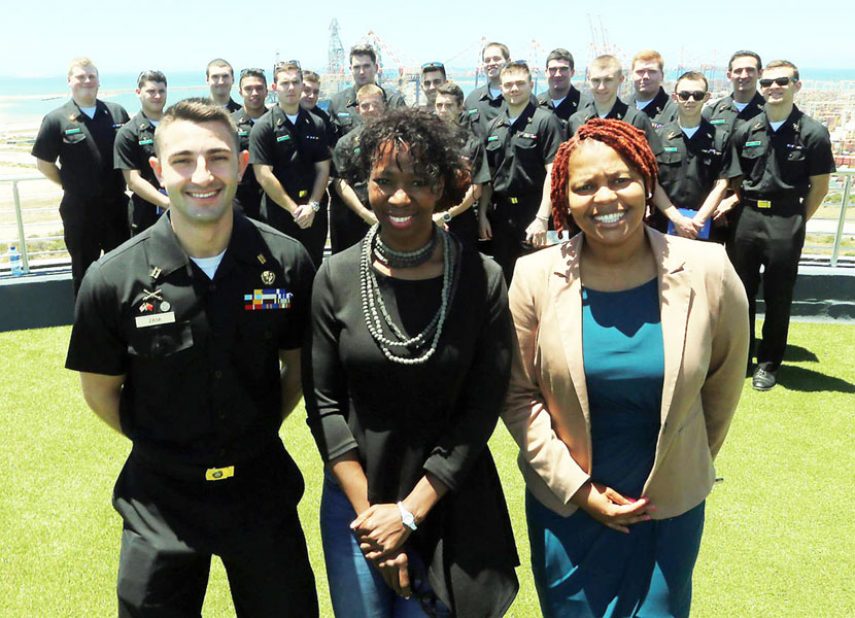MARITIME business students from the United States visited Nelson Mandela Bay recently as part of a South African tour to explore the cultural complexity of the global maritime industry.
Hosted by the South African International Maritime Institute (SAIMI), which is headquartered in the Bay, the 19 top-performing students from the Massachusetts Maritime Academy enjoyed a welcome lecture at Nelson Mandela University by local marine tourism expert Peter Myles and a tour of the deepwater Port of Ngqura.
Also on their itinerary was a visit to Siyaloba Training Academy to experience the role of a social enterprise in skills training for the maritime sector – teaching sea survival skills to local fishermen.
In addition, the group got a first-hand view of the Eastern Cape’s key fishing industry – squid fishing and processing – before moving on to Cape Town, where they will spend a further two weeks visiting major maritime industry businesses and education and training providers.
The academy’s South African-born international maritime business lecturer, Dr Portia Ndlovu, said part of the reason for the students’ visit to South Africa was the need to be part of the “global respect train”.
While the sector and its education and training facilities were adapting to rapid technological advances spawned by the fourth industrial revolution, Ndlovu said students also needed to acquire the interpersonal communication skills required to work in the global shipping industry.
“As such, students at the academy are not only exposed to experiential training, but also to the different cultures they are likely to encounter along their career path,” she said.
“The global maritime family is expanding all the time, and it is vitally important to understand the different cultures that they may encounter.”
SAIMI spokesperson Samantha Venter said effective cultural exchange was crucial in facilitating the transfer of global best practices and in finding solutions that work for each environment and customer.
“SAIMI plays a much-needed linking role between industry and roleplayers in maritime research, education and training, and we also help to facilitate international and continental cooperation. So, being able to support professional development and share our advances with international visitors is a big part of putting the African maritime sector on the global map.”
Venter said the focus of the tour for both parties was to learn from each other and to explore the possibility of further exchanges of expertise in the future.
One of the Massachusetts-based academy’s senior students and tour leaders, Nick Zaia, said the maritime sector opened up a world of opportunities but that it required discipline and a sense of responsibility to succeed.
“Our training also incorporates a military aspect,” he said.
“While not everyone will pursue a shipping career in the military – as a coastguard for example – it is still vital that everyone in the industry has a strong sense of leadership and discipline.
“Eventually, whichever line you follow, lives will be in your hands. It is up to us to accept that massive responsibility at an early age.”
During their visit to the Port of Ngqura, which was facilitated by Transnet, the students were introduced to the state-of-the art automated mooring system at the harbour. A first in South Africa, the system was specifically developed for the port, allowing repair and maintenance work on ships to continue even in extremely windy conditions.
They were also shown environmental successes, such as a pier specifically built to play the role of Mother Nature, ensuring that sand continues to follow the movement pattern that it would have done before the harbour was built.

